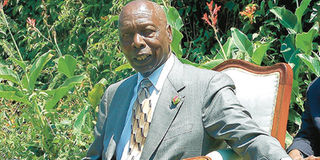Why I brought back Moi Day public holiday

Retired President Daniel Arap Moi. There is a built-in irony to the consideration of Moi Day. Former President Moi did not stand up and declare it a holiday; he had Parliament amend the Public Holidays Act.
PHOTO | FILE | NATION MEDIA GROUP
What you need to know:
- Breaking the law in order to tear down a monument to a ruler we don’t think deserved it strengthens the monuments to lawlessness that constituted the worst parts of that regime.
In this, the rule of law was adhered to and yet, nearly 30 years later, after the fight for multipartyism, promulgation of a new constitutional dispensation.
Last year, I filed a case in the High Court questioning the government’s decision to scrap the Moi Day public holiday. In a November 9 judgement, Justice George Odunga declared that October 10 is, in fact, a public holiday and should be observed.
Legend has it that the month of August has 31 days because Caesar Augustus wanted his month to be as long as Julius Caesar’s. Fast forward to 1989, leave the Roman Empire for the Republic of Kenya and history repeats itself.
NOSTATEMENT
The second president of Kenya has a day named after him and declared a public holiday, just like the first president did. A look around Kenya and its institutions are a testament to that vanity.
In a vain attempt at immortality, the two men stamped their names across the country in its various institutions, made themselves felt temporally by dedicating days and insinuated themselves into every monetary transaction. But roads become potholed, currency is worn through and statues decay and crumble.
Yet after President Daniel arap Moi’s exit Moi Day was celebrated as a public holiday for eight years. Then came the 2010 Constitution with the definition and dates of national days, renaming Kenyatta Day as Mashujaa Day but making no statement on Moi Day.
EXISTING LAWS
Within the 2010 Constitution is the proviso that all laws existing before it have effect as long as they don’t contradict it. One of these is the Public Holidays Act, which Parliament amended during Moi’s time to give him his day. It recognises Moi Day not as a national day but a public holiday.
This is an important distinction showing the Public Holidays Act does not contravene the Constitution. Boxing Day is also celebrated on December 26 as a public holiday for the same reason.
This means Moi Day is still a public holiday; we just conveniently forgot about it.
One of the tenets of democracy is the rule of law. The law, as a ruler, binds everyone — even the government. It states that October 10 is Moi Day and should be celebrated as a public holiday. This has not been done for eight years.
BUILT-IN IRONY
Breaking the law in order to tear down a monument to a ruler we don’t think deserved it has the unintended effect of strengthening the monuments to lawlessness that constituted the worst parts of that regime.
There is a built-in irony to the consideration of Moi Day. Then-President Moi did not stand up and declare it a holiday; he had Parliament amend the Public Holidays Act.
In this, the rule of law was adhered to and yet, nearly 30 years later, after the fight for multipartyism, promulgation of a new constitutional dispensation and even the overturning of a presidential election, the proper procedure to have this day taken off the books was not followed.
There is another necessary reason to observe this holiday: Workers.
21 LEAVE DAYS
In this country, only a tiny minority are granted the 21 leave days that the Employment Act provides for. Most people go to work everyday except weekends. In a country with an attitude towards worker’s rights as that displayed by most employers, a public holiday is a necessity. It is, for many, the only day they get to rest and relax.
In addition, a public holiday is, for almost everyone, the only day that a family can gather and friends can see each other.
Mr Nyauchi is an advocate of the High Court of Kenya. [email protected]. Twitter: @gmagaria.




